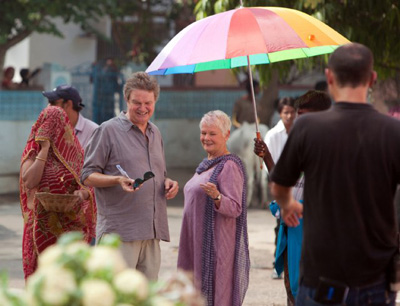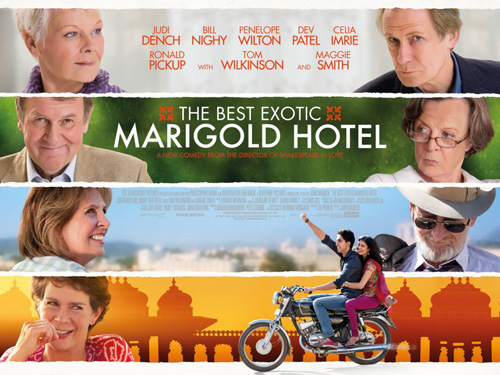 The Best Exotic Marigold Hotel, which opens in the US on May 4th, brings together some of the finest actors and actresses ever to grace the screen including Dame Judi Dench, Dame Maggie Smith, Bill Nighy, Tom Wilkinson, Celia Imrie, Penelope Wilton and Ronald Pickup. Add in the Academy Award and Bafta nominated director John Madden, who has given us such exceptional fare as Shakespeare in Love, and The Best Exotic Marigold Hotel promises to be an outstanding film. The story is unexpected, rich, funny, moving, inspiring, sad, overwhelming and full of incredible moments…it follows a group of British retirees who decide to “outsource” their retirement to less expensive and seemingly exotic India. Down on their luck and enticed by advertisements for the “newly restored” Marigold Hotel and with visions of a more meaningful retirement at a price they can afford, they arrive to find the Hotel somewhat less grand and lush than they expected. The Brits are equally disoriented by an India full of contrasts, at once intoxicating and frightening, traditional and modern, beautiful and strange. At first, these seven newcomers seem unsure about what the future might hold but as they begin to forge new friendships, they make some unexpected discoveries and start to let go of their past-based lives and begin to look to the present and the future.. The manager (Dev Patel) promises them a transformation, but it is not just the building that is transformed in John Madden’s The Best Exotic Marigold Hotel. I was given the incredible opportunity to talk with Mr. Madden about the film when he was in New York for the premiere. It was surprisingly more of a conversation than an interview and one of the most enjoyable ones I have ever had. I could have gone on asking him questions for hours but, alas, our time was limited. I am thrilled to present to you the words of the amazing Mr. Madden on making the film, shooting in India, working with, as he says “some extraordinary actors doing what they do very brilliantly”, and the magic that is The Best Exotic Marigold Hotel.
The Best Exotic Marigold Hotel, which opens in the US on May 4th, brings together some of the finest actors and actresses ever to grace the screen including Dame Judi Dench, Dame Maggie Smith, Bill Nighy, Tom Wilkinson, Celia Imrie, Penelope Wilton and Ronald Pickup. Add in the Academy Award and Bafta nominated director John Madden, who has given us such exceptional fare as Shakespeare in Love, and The Best Exotic Marigold Hotel promises to be an outstanding film. The story is unexpected, rich, funny, moving, inspiring, sad, overwhelming and full of incredible moments…it follows a group of British retirees who decide to “outsource” their retirement to less expensive and seemingly exotic India. Down on their luck and enticed by advertisements for the “newly restored” Marigold Hotel and with visions of a more meaningful retirement at a price they can afford, they arrive to find the Hotel somewhat less grand and lush than they expected. The Brits are equally disoriented by an India full of contrasts, at once intoxicating and frightening, traditional and modern, beautiful and strange. At first, these seven newcomers seem unsure about what the future might hold but as they begin to forge new friendships, they make some unexpected discoveries and start to let go of their past-based lives and begin to look to the present and the future.. The manager (Dev Patel) promises them a transformation, but it is not just the building that is transformed in John Madden’s The Best Exotic Marigold Hotel. I was given the incredible opportunity to talk with Mr. Madden about the film when he was in New York for the premiere. It was surprisingly more of a conversation than an interview and one of the most enjoyable ones I have ever had. I could have gone on asking him questions for hours but, alas, our time was limited. I am thrilled to present to you the words of the amazing Mr. Madden on making the film, shooting in India, working with, as he says “some extraordinary actors doing what they do very brilliantly”, and the magic that is The Best Exotic Marigold Hotel.
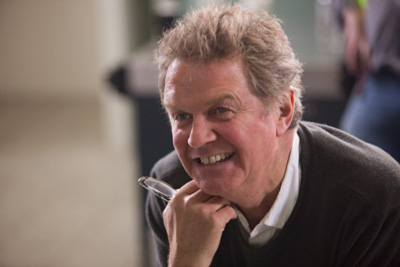
What drew you to the story of The Best Exotic Marigold Hotel?
Well, I was very intrigued by two things in particular. Obviously one was an opportunity to look at the experience of older people. That is a state of mind I’m not so far away from approaching myself. (Laughs) I thought that it is a neglected constituency as far as film subject matter is concerned, both in terms of audience and also in terms of the subject matter that makes up the film. I was very attracted to the idea of being able to look at some of those issues in the context of humor, because I think that’s a way in which you can disarm your audience and smuggle in some more interesting investigations without becoming earnest and so on. Also, I was very attracted to India as a subject, as a world, and the cultural collision that’s built into the premise of the piece seemed very promising and very rich to me. As a filmmaker you can’t not be stimulated and excited by India as a world to make a film in, because it’s an extraordinary place. So those two things primarily, but actually as I started to think about the tone of the story it suggested something that I think is also very magic on film: it is that you could create a film that was very, what I call, present tense. In other words, where the characters were going through a very intense experience in a very compressed period of time because of the circumstances of the film, which then reflects the experience the audience is having watching it. So it’s actually about a kind of intoxication: the characters fall under some spell because they don’t understand the world they are in and the environment is magical in some way. I’ve pointed out in the production notes, which I’m sure you’ve read, that this is a very Shakespearean concept. It’s very much the paradigm of every mature Shakespearean comedy and that’s the world I feel happy in and understand (Smiles). I felt I could really control the story in an interesting way once I realized that.
To mix those two worlds must have been amazing.
Yes, yes it was.
So you had quite an incredible cast…
Yes!

That scene where you have all seven of them sitting at the airport… What were your thoughts seeing Judi Dench, Maggie Smith, Bill Nighy, Tom Wilkinson, Celia Imrie, Penelope Wilton and Ronald Pickup in a row in that shot…
(Laughs) Well, I confess freely that was an idea that was devised while I was preparing the film. At one point we had a scene where the characters all got on the plane together and I had no interest in shooting that scene. Plane scenes are always boring, and restrictive. I suddenly realized that there was something marvelous about the fact, though of course it’s an outrageous suggestion, that they would all end up sitting next to each other at the airport (Laughs). But it’s a point that it has to do with the tone of the film where you can bring these seven people together, none of who knows each other, except for the husband and wife, and the image of them all sitting on the edge, on the verge of an experience, which they don’t know they’re going to share with the people sitting next to them. It makes a sort of meta joke because the audience, of course, is watching, knowing perfectly well that these seven people are going to be in each other’s lives for the rest of the film. Not only that, but they are also aware that these are seven extraordinary actors (laughs) all lined up in front of us, so it seemed kind of a very good way of getting under the audience’s radar. There’s a point at that moment where the audience sort of smiles knowing what its in for, even if the characters don’t, as it were, know what they are in for. I suppose I was long past thinking, ‘Wow, that’s a hell of a cast’, although you DO think that when the camera pulls back and all seven of them are in that one shot. Somebody pointed out to me this weekend. ‘You know, this is your super hero movie!’ Avengers is the one you are going up against and it’s got Iron Man and it’s got Captain America. But in this film, there are some amazing big guns. They are people who know so well what they are doing and have such a brilliant sense of comedy and a fantastic set of skills and experience in depth, that it is a wonderful thing to watch. It’s just wonderful to watch them, you know, let loose in this world.
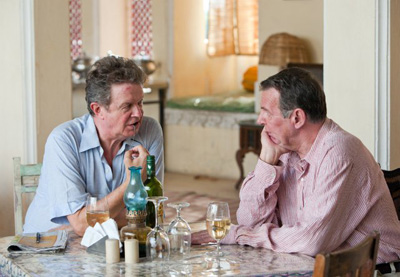
With such incredible actors did you just set the scene, give them the basis and let them go?
Well, as a working method that is half a million miles away from what happened. Very unusually, Ol Parker (screenwriter) and I were able to rewrite the script and we really dismantled it and then built it again from the ground up once we knew not just who the cast were, but also the environment, because by that time I had found the hotel. We wrote the entire story around each actor and the circumstances itself, so we were writing for their voices and for the qualities that we knew they had and that meant that it was a very nice situation. Of course, obviously I had to deal with the mise-en-scene and I had to deal with the physicality of it and what the shots were … I had to give them that sort of guidance, and there was a lot of orchestration to do in that respect. Otherwise we didn’t rehearse extensively. I rehearsed with each actor individually just to make sure that we were in agreement about the stories being aligned and then I let them respond. With actors of that caliber that’s the way you find the riches, because why would I be telling them what to do? The story is very clearly laid out and hopefully the scenes are well written and where they weren’t, we made sure they were and we went on rewriting and adjusting the script all the way through the shoot, and learned things as we went along. For example, the scene with Judi and Tina Desae, the girl who plays Sunaina, at the call center. It’s a wonderful scene. We wrote that right at the end of the film and shot it later because we suddenly realized what that scene should be. We shot some version of it before and it wasn’t as rich and full in its telling as it could have been, and I said, I’m going to need to do that scene again. Now I understand what it needs to be. So that’s great advantage when you can do that.
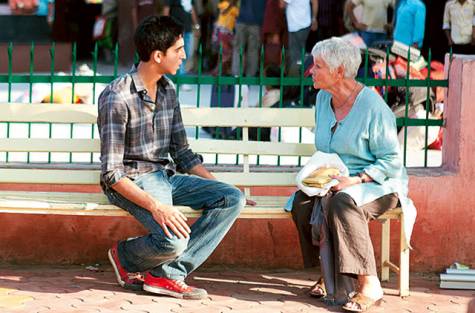
Let’s talk about Dev Patel as Sunny.
I consider myself incredibly lucky with him for reasons it would take too long to explain. I was involved with the film very, very earlier on, but I couldn’t do it at that point because I was directing another film. I said to the producer, who is a friend of mine, you need to go make this film. He bought the option on it and he couldn’t have the piece in development for three years. I said, you may have to wait that long for me so I said go ahead and make it with somebody else, which he did. And as these things happen it never quite came together; they couldn’t get the right cast formation or suddenly they couldn’t any longer shoot in India for the next six months because of the weather and so on. It came back to me at a point where the project I was about to do got pushed back, and this project was open, and the producer turned to me and said “Would you do this now?!” By that time one or two actors had a relationship with the material and Dev was one of them. I didn’t know what to think about that because I said, well, look this part is crucial, he’s the center of the story. I didn’t know whether Dev had that in him. Out of courtesy to the fact that he had been wanted by the director before me, I met and and read with him, and I was dazzled frankly. I just couldn’t believe how perfectly his talents aligned with the part. We immediately wrote the part around him. He has a sort of extraordinary natural sweetness and innocence about him, but he also has this marvelous kind of comic energy and a physical presence that’s very unusual, and he’s a natural physical clown. And so I felt very, very lucky about that. I think he’s a massive kind of asset to the film. And you know obviously he was very daunted by the company he was in, but they were all knocked out by him to be honest. A lot of his early scenes involved being in front of all of them at the same time (Laughs). He very quickly felt at home. He’s quite a daring actor, you know. He’ll go right out on a limb and try something and sometimes fall flat on his face, but I admire that about him. He’s very real and very true and brought an emotional kind of grounding to the film that I really admired.
I found it very interesting that you chose to shoot India almost as if we, the audience were dropped in there with them…
Yes! That’s a very astute observation. That’s exactly what I said to everybody. I said, look, we have to approach this place the way they feel and experience it. I think that’s the way to shoot anything. You want to put the audiences as much in the perspective of the characters as you can. You don’t want to be commenting on the place, you just want to experience it as viscerally and as immediately as you can. The film is so in the present tense all the time. All these people are experiencing every thing anew and so the kind of strategy of the filmmaking was to try and replicate that. The Indian production company kept saying to me, ‘Well, don’t you want to clear the streets, you know we can get everything out of it and put our own things in there’. I said, no, I don’t want to do that (laughs) because I’ll never be able to match what’s there. We’ll never be able to afford it and we’ll never be able to control it. So, let me find a way of working with what’s there, which largely is what we did. You know this whole sequence of the train station for example, real life was going around us there and we found a way of coping with that. And also, as an outsider when you approach India, the version that is transmitted by the tourist industry is to do it with serenity, calm and peace and spirituality and see these marvelous, beautiful, timeless buildings, and of course you go there and it’s completely different (Laughs). It’s chaotic and energetic and unbelievably overwhelming. I thought well, that’s what’s going to strike these people because they have no money – any of them – they have to engage with the culture at a much more fundamental level, they are in a hotel that isn’t what it promises to be, they’ve got to repair their own taps, they’ve got to go out and get jobs, they’ve got to engage with the bureaucracy, all of these things. I felt that that was the challenge, so it’s not difficult to do that if you just decide that’s the way you want to do it. Within the rhythm of the story that other side of India that I referred to earlier does of course come into the story, when they go deep into the kind of cultural experience of the country in certain scenes. That, of course, is a part of India as well and is a part that overwhelms you just as much when you encounter it. Because they were thrown into the middle of the city all these experiences came about and are part of the movies sequences. And you know all of these sequences in the film came about because of my experience of it – the tuk-tuks, the motorbikes, the festivals – they made their way into the film because that’s what was happening to me.
In many Bollywood films we see India in a different way.
You see it in a very stylized way, which actually is marvelous and I found riveting actually, as I started to watch more and more stuff. But this film is stylized in a different way because there is a sort of magical level; you know it’s a kind of fairy tale on one level. Although I don’t want to imply that it isn’t real, because it is, and the characters’ experience is all grounded in a certain kind of reality, but there is an enchantment there. The characters are enchanted by the world that they are in and that enchantment is there too in India, as everybody knows.
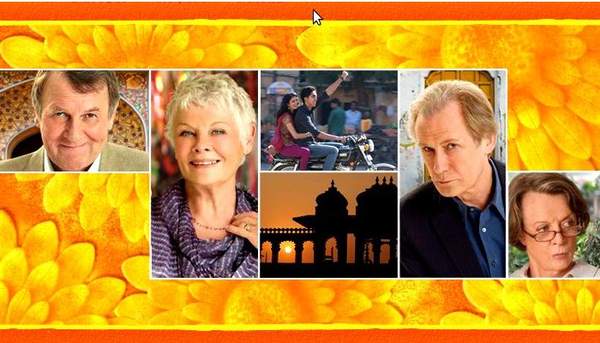
What do you hope audiences are going to love about the film?
Well, what do people love about films? I think they love being taken into a world they don’t know, be that a horror world or action world or exciting world or tense world or whatever it may be, and this certainly offers you that. It’s an incredible emersion in a certain sense of place and experience. I think the film is surprising. It’s not what you’d expect. I think when people hear about the film they go, oh, I get it, I know what’s it going to be, and it is not that. I can’t pretend that I imagine that people won’t be exhilarated to come out of a film that is essentially optimistic. The film is optimistic, and says: you don’t have to surrender and assume you life is over at a certain point. You don’t have to stay in a marriage if it’s not working. You don’t have to assume that because the love of your life has gone – is no longer there – that your life has to stop. I imagine people will respond to that. And I imagine they will respond to watching some extraordinary actors doing what they do very brilliantly. I think that’s quite a nice menu (Laughs).
I loved the film when I saw it at an early screening and so did the audience who clapped at the conclusion of the film. I already wanted to see the film again but after talking with Mr. Madden, I wanted to go that very day and cannot wait to get my hands on the DVD! Be sure and see The Best Exotic Marigold Hotel, a rich pageant where the lens of people’s lives turn from the past to a new future. Everything that is promised on the menu is delivered and even more!

